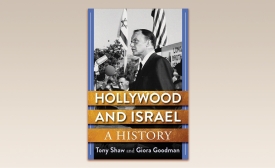hollywood

The authors' recent book chronicles the impact of show business on international relationships, soft power and more involving Israel and major events in the Middle East.

Neal Rosendorf urges the entertainment industry to leverage its public diplomacy prowess for the greater good.

Film and television play a critical role in shaping America's soft power abroad. The COVID-19 crisis has brought Hollywood to a standstill as productions are put on hold. What does a post-pandemic future look like for Hollywood, and what are the implications for America's soft power?

CPD Senior Visiting Fellow (Non-Resident) Oliver Lewis compares and contrasts the film and intelligence industries' approaches to "human intelligence."
The biggest box office stars don’t always hail from the US, they come from other places, too. Beyoncé, the internationally famous and quite possibly most talked-about woman in the world, has about 14.7 million Twitter followers. She’s ranked at, roughly, the 119th most popular person on Twitter. Shakira, the Colombian-born pop star, has a whopping 45.2 million Twitter followers. She’s about 18th on the Twitter popularity scale. [...] This is not to say that American movie stars are not popular, it's just that the Hollywood's near monopoly for almost a century is lo longer in effect.
Dangal’s success story in China — coming as it does, five months after its theatrical release in India and elsewhere — has triggered a stream of breathless box office updates, analytical thinkpieces, and odes aplenty. As it should. [...] Egyptian hawkers referring to Indian women visitors as “Kareena! Aishwarya!” isn't surprising. But to have a teenager from the tiny island country of Timor Leste tell you that Preity Zinta’s Kya Kehna is his favourite film, or have folks in Vietnam express sadness about Balika Vadhu actress Pratyusha Banerjee’s suicide — that is surreal.
The long-lasting battle between Turkey and Armenia over the acceptance or denial of the Armenian genocide has gone to Hollywood, which has wheeled out two historic epics to offer competing perspectives on the World-War-I-era massacre. The Promise and The Ottoman Lieutenant are both panoramic love stories set in the chaotic twilight of the Ottoman Empire, but worlds apart.







